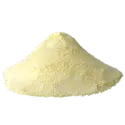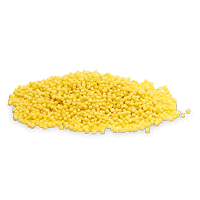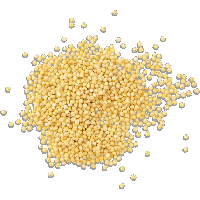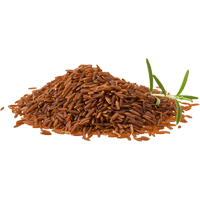Cornmeal, yellow (Navajo) nutrition: calories, carbs, GI, protein, fiber, fats
*all the values are displayed for the amount of 100 grams
Top nutrition facts for Cornmeal, yellow (Navajo)

| Calories ⓘ Calories for selected serving | 384 kcal |
| Net Carbs ⓘ Net Carbs = Total Carbohydrates – Fiber – Sugar Alcohols | 64 grams |
| Acidity (Based on PRAL) ⓘ PRAL (Potential renal acid load) is calculated using a formula. On the PRAL scale the higher the positive value, the more is the acidifying effect on the body. The lower the negative value, the higher the alkalinity of the food. 0 is neutral. | 3.5 (acidic) |
Carbs ⓘHigher in Carbs content than 91% of foods
Net carbs ⓘHigher in Net carbs content than 88% of foods
Fiber ⓘHigher in Fiber content than 88% of foods
Magnesium ⓘHigher in Magnesium content than 86% of foods
Calories ⓘHigher in Calories content than 83% of foods
Cornmeal, yellow (Navajo) calories (kcal)
| Calories for different serving sizes of cornmeal, yellow (Navajo) | Calories | Weight |
|---|---|---|
| Calories in 100 grams | 384 |
Mineral coverage chart
Mineral chart - relative view
Vitamin coverage chart
Vitamin A:
0µg of 900µg
0%
Vitamin E:
1.1mg of 15mg
7.4%
Vitamin D:
0µg of 20µg
0%
Vitamin C:
0mg of 90mg
0%
Vitamin B1:
0.9mg of 1mg
75%
Vitamin B2:
0.28mg of 1mg
21%
Vitamin B3:
7.4mg of 16mg
46%
Vitamin B5:
1.8mg of 5mg
36%
Vitamin B6:
1.8mg of 1mg
136%
Folate:
102µg of 400µg
26%
Vitamin B12:
0µg of 2µg
0%
Vitamin K:
0.6µg of 120µg
0.5%
Vitamin chart - relative view
Macronutrients chart
Protein:
Daily Value: 20%
9.9 g of 50 g
9.9 g (20% of DV )
Fats:
Daily Value: 9%
5.9 g of 65 g
5.9 g (9% of DV )
Carbs:
Daily Value: 24%
72.9 g of 300 g
72.9 g (24% of DV )
Water:
Daily Value: 1%
10.2 g of 2,000 g
10.2 g (1% of DV )
Other:
1.2 g
1.2 g
Protein quality breakdown
Tryptophan:
150mg of 280mg
54%
Threonine:
921mg of 1,050mg
88%
Isoleucine:
1110mg of 1,400mg
79%
Leucine:
3825mg of 2,730mg
140%
Lysine:
903mg of 2,100mg
43%
Methionine:
690mg of 1,050mg
66%
Phenylalanine:
1497mg of 1,750mg
86%
Valine:
1482mg of 1,820mg
81%
Histidine:
795mg of 700mg
114%
Fat type information
Saturated fat:
1 g
Monounsaturated fat:
2.1 g
Polyunsaturated fat:
2.4 g
Carbohydrate type breakdown
Starch:
62 g
Sucrose:
1.2 g
Glucose:
0.22 g
Fructose:
0.15 g
Lactose:
0 g
Maltose:
0 g
Galactose:
0 g
Fiber content ratio for Cornmeal, yellow (Navajo)
Sugar:
1.6 g
Fiber:
9.4 g
Other:
62 g
All nutrients for Cornmeal, yellow (Navajo) per 100g
| Nutrient | Value | DV% | In TOP % of foods | Comparison |
| Calories | 384kcal | 19% | 17% |
8.2 times more than Orange
|
| Protein | 9.9g | 23% | 44% |
3.5 times more than Broccoli
|
| Fats | 5.9g | 9% | 47% |
5.7 times less than Cheese
|
| Vitamin C | 0mg | 0% | 100% |
N/A
|
| Net carbs | 64g | N/A | 12% |
1.2 times more than Chocolate
|
| Carbs | 73g | 24% | 9% |
2.6 times more than Rice
|
| Magnesium | 107mg | 25% | 14% |
1.3 times less than Almonds
|
| Calcium | 6mg | 1% | 88% |
20.8 times less than Milk
|
| Potassium | 322mg | 9% | 32% |
2.2 times more than Cucumber
|
| Iron | 3mg | 37% | 21% |
1.2 times more than Beef broiled
|
| Sugar | 1.6g | N/A | 62% |
5.8 times less than Coca-Cola
|
| Fiber | 9.4g | 38% | 12% |
3.9 times more than Orange
|
| Copper | 0.24mg | 27% | 28% |
1.7 times more than Shiitake
|
| Zinc | 3.1mg | 28% | 30% |
2 times less than Beef broiled
|
| Starch | 62g | 25% | 87% |
4.1 times more than Potato
|
| Phosphorus | 225mg | 32% | 28% |
1.2 times more than Chicken meat
|
| Sodium | 4mg | 0% | 92% |
122.5 times less than White bread
|
| Vitamin E | 0.37mg | 2% | 63% |
3.9 times less than Kiwi
|
| Manganese | 0.64mg | 28% | 35% | |
| Selenium | 6µg | 11% | 66% | |
| Vitamin B1 | 0.3mg | 25% | 27% |
1.1 times more than Pea raw
|
| Vitamin B2 | 0.09mg | 7% | 70% |
1.4 times less than Avocado
|
| Vitamin B3 | 2.5mg | 15% | 54% |
3.9 times less than Turkey meat
|
| Vitamin B5 | 0.6mg | 12% | 52% |
1.9 times less than Sunflower seeds
|
| Vitamin B6 | 0.59mg | 45% | 20% |
5 times more than Oats
|
| Vitamin K | 0.2µg | 0% | 85% |
508 times less than Broccoli
|
| Folate | 34µg | 9% | 40% |
1.8 times less than Brussels sprouts
|
| Saturated fat | 1g | 5% | 60% |
5.7 times less than Beef broiled
|
| Monounsaturated fat | 2.1g | N/A | 51% |
4.6 times less than Avocado
|
| Polyunsaturated fat | 2.4g | N/A | 28% |
20.1 times less than Walnut
|
| Tryptophan | 0.05mg | 0% | 86% |
6.1 times less than Chicken meat
|
| Threonine | 0.31mg | 0% | 78% |
2.3 times less than Beef broiled
|
| Isoleucine | 0.37mg | 0% | 78% |
2.5 times less than Salmon raw
|
| Leucine | 1.3mg | 0% | 70% |
1.9 times less than Tuna Bluefin
|
| Lysine | 0.3mg | 0% | 81% |
1.5 times less than Tofu
|
| Methionine | 0.23mg | 0% | 74% |
2.4 times more than Quinoa
|
| Phenylalanine | 0.5mg | 0% | 75% |
1.3 times less than Egg
|
| Valine | 0.49mg | 0% | 76% |
4.1 times less than Soybean raw
|
| Histidine | 0.27mg | 0% | 75% |
2.8 times less than Turkey meat
|
| Fructose | 0.15g | 0% | 91% |
39.3 times less than Apple
|
| Omega-3 - ALA | 0.06g | N/A | 88% |
152.3 times less than Canola oil
|
| Omega-6 - Gamma-linoleic acid | 0g | N/A | 100% | |
| Omega-6 - Eicosadienoic acid | 0g | N/A | 100% |
Check out similar food or compare with current
NUTRITION FACTS LABEL
Nutrition Facts
___servings per container
Serving Size ______________
Serving Size ______________
Amount Per 100g
Calories 384
% Daily Value*
9%
Total Fat
5.9g
4.7%
Saturated Fat 1g
0
Trans Fat
0g
0
Cholesterol 0mg
0.17%
Sodium 4mg
24%
Total Carbohydrate
73g
38%
Dietary Fiber
9.4g
Total Sugars 0g
Includes ? g Added Sugars
Protein
9.9g
Vitamin D
0mcg
0
Calcium
6mg
0.6%
Iron
3mg
37%
Potassium
322mg
9.5%
*
The % Daily Value (DV) tells you how much a nutrient in a serving of food contributes to a daily diet. 2,000 calories a day is used for general nutrition advice.
Health checks
ⓘ
Dietary cholesterol is not associated with an increased risk of coronary heart disease in healthy individuals. However, dietary cholesterol is common in foods that are high in harmful saturated fats.
Source
Low in Cholesterol
ⓘ
Trans fat consumption increases the risk of cardiovascular disease and mortality by negatively affecting blood lipid levels.
Source
No Trans Fats
ⓘ
Saturated fat intake can raise total cholesterol and LDL (low-density lipoprotein) levels, leading to an increased risk of atherosclerosis. Dietary guidelines recommend limiting saturated fats to under 10% of calories a day.
Source
Low in Saturated Fats
ⓘ
While the consumption of moderate amounts of added sugars is not detrimental to health, an excessive intake can increase the risk of obesity, and therefore, diabetes.
Source
Low in Sugars
References
All the values for which the sources are not specified explicitly are taken from FDA’s Food Central. The exact link to the food presented on this page can be found below.


